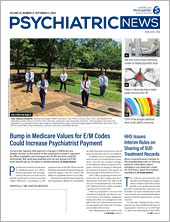Psychiatrists could see an increase in reimbursement for office-based evaluation and management (E/M) services and certain specific psychiatric services provided under Medicare, according to the proposed rule on the 2021 Physician Fee Schedule and Quality Payment Program released August 3 by the Centers for Medicare and Medicaid Services (CMS).
Payments for individual psychiatrists participating in Medicare will depend on individual practice patterns: mix of patients and types of services rendered.
In addition to covering adjustments and changes to overall physician payment, the rule also includes changes to the Medicare Quality Payment Program. (Details on changes to the Quality Payment Program will appear in the September 18 Psychiatric News.)
Also, CMS is proposing to move forward with the new coding and documentation structure for office E/M services recommended by the AMA’s CPT Editorial Panel, which includes representatives from APA.
CMS has proposed to increase the valuation of specific psychiatric services (such as psychiatric diagnostic evaluation) that are analogous to the office E/M visits and increase payments for psychotherapy when the visit does not include E/M services.
The CMS proposal also reduces the documentation requirements for office E/M services and expands the options for billing office E/M services on the basis of time spent with the patient.
Additionally, the proposed rule includes important updates regarding telehealth (see box).
The CMS proposal is available for public comment until October 5, and APA staff are continuing to analyze its impact on psychiatrists.
The good news for psychiatry with regard to payment is that CMS has accepted recommendations to increase the RVUs (relative work value units) for office-based E/M services provided by psychiatrists.
These proposed changes result in an overall increase in allowed charges billed by those defined as “psychiatrists” of 8%. So most individual psychiatrists who do any amount of E/M work should see an increase in reimbursement for those services. However, because of budget neutrality requirements under current law, across-the-board cuts for other services will be necessary.
(Under the Resource-Based Relative Value Scale, CMS determines physician payment according to a formula that includes RVUs for each service provided by a physician and geographically adjusted physician practice and malpractice expenses multiplied by a conversion factor that is determined by CMS. The law requires that any changes to the RVUs cannot increase or decrease expenditures for physicians’ services overall by more than $20 million. The adjustment in payments is made through an increase or reduction in the conversion factor.)
APA has signed onto a letter to the administration with the AMA asking that the budget neutrality provision be waived. “We appreciate the administration’s proposal to increase payment for office visits, based on recommendations from the AMA’s Relative Value Update Committee,” said APA CEO and Medical Director Saul Levin, M.D., M.P.A. “It is unfortunate these increases will be offset by a very severe cut in the Medicare conversion factor. We join the AMA in asking CMS to waive the budget neutrality requirement.”
Finally, APA has worked for several years to promote improved access to psychiatric care through early identification, intervention, and treatment by primary care physicians and other health care professionals with consultation from psychiatrists. The CMS proposal includes increased payments for psychiatric collaborative care management (CoCM) and a proposal to add a code to the CoCM family of codes that capture shorter increments of time. ■
The proposed Medicare 2021 Physician Fee Schedule and Quality Payment Program is posted
here.
Members who have questions about the proposed rule should contact the APA Practice Management Helpline at 800-343-4671.
Those interested in commenting on the proposed rule should go to
http://www.regulations.gov and follow the “Submit a comment” instructions.
